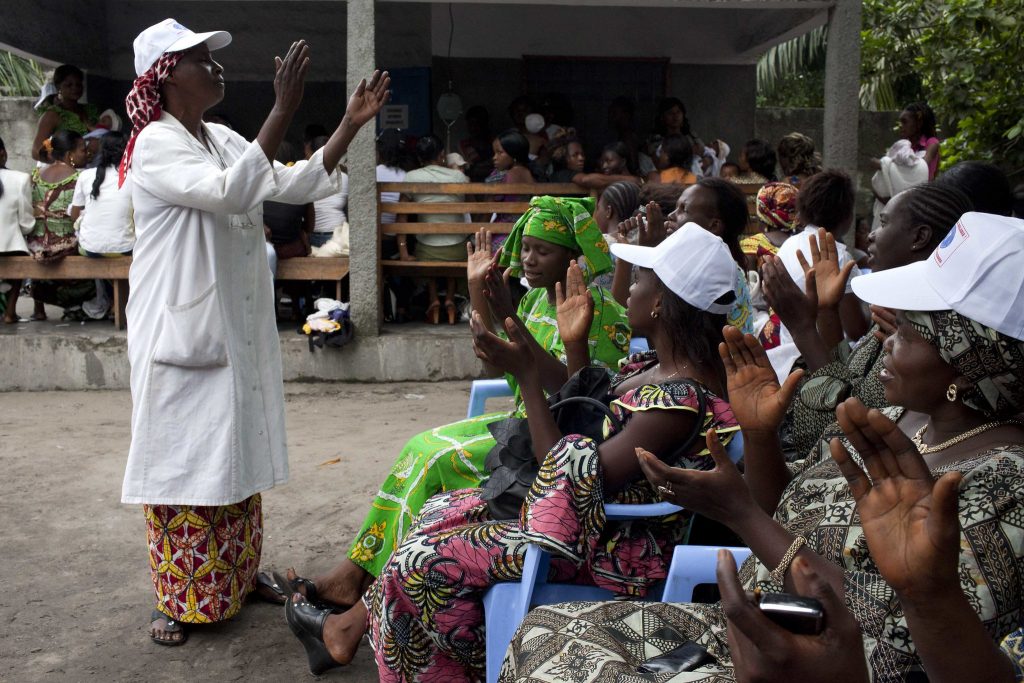GPSA projects
Improving Health Service Delivery
Project: Reinforcing Social Accountability of Health Services in Bas Congo and South Kivu Provinces
Country: Democratic Republic of Congo
Sector: Health
Executing Agency: The Catholic Organization for Relief and Development Aid (CORDAID)
Grant Amount: $ 800,000
Closing Date: November 2018


Frame and Challenge
As the third most populous country in Sub-Saharan Africa, the Democratic Republic of Congo (DRC) has a lot of human capital potential. In addition, overall macroeconomic indicators such as inflation rates are stable, and economic growth has maintained an upward trend in recent years, with GDP annual growth remaining around 6% as of 2018. Despite becoming one of Africa’s fastest growing economies, the DRC is riddled by widespread poverty, which particularly affects rural areas. The country remains fragile after suffering decades of violence and conflict, as reflected in the weak capacity of public institutions to accelerate poverty reduction and improve development outcomes for citizens across the country.
Poor development results are particularly palpable in the health sector. Almost half of all children under the age of five are malnourished. Maternal mortality rates have remained stubbornly high despite government efforts to train and implement midwives and to improve access to and quality of health services. At the local level, Health Facility Committees (HFCs) act as mechanisms through which citizens can interact with health authorities and service providers, but they have not been completely effective at fulfilling their roles. The health sector is marred by inefficiencies, insufficient funding, poor infrastructure, limited accountability, and weak institutional capacity. The situation is particularly acute in regions like South Kivu, North Kivu, and Katanga where there remain many internally displaced persons and sporadic outbreaks of conflict.
Solution
CORDAID, a reputable organization with extensive experience in the DRC, has been granted a GPSA award to improve the quality and the access of frontline health care services in DRC by strengthening the capacity of HFCs to engage with health authorities in eleven health zones in South Kivu and Bas Congo regions. This will be achieved by implementing four components geared towards:
- reinforcing the HFC system by strengthening the capacity of its members and service delivery authorities to utilize the system effectively;
- empowering HFCs to take a larger role in improving health services and collecting citizen feedback;
- supporting the integration of the poorest and most vulnerable sectors of the population in targeted zones; and
- building the capacity of CSOs involved in the Project to implement and practice social accountability, and collect knowledge to improve project design, disseminate outcomes and share lessons learned by HFCs and local authorities.
Outcomes
The CORDAID grant has produced several important preliminary outcomes, including but not limited to:
- 3700 citizens, organized in 185 formerly ineffective Community Health Management Committees now use community score cards and other tools to identify priority issues in their respective health situations, provide adequate feedback to authorities and identify appropriate solutions.
- 60% of community health management committees now include representatives of vulnerable and marginalized people.
- Community grants are allocated more effectively thanks to improved communication and trust between health center users, providers, and government regulators.
- Health centers have received new equipment. Outside of the centers, simple improvements, such as new water pumps and sturdy sheds for prenatal care, have been added to community facilities.
Lessons Learned
There have been many lessons learned and takeaways from this project’s implementation of feedback mechanisms and inclusive social accountability tools thus far, including:
- The decentralization process in the DRC throughout Project implementation has greatly contributed to the success of the project. Decentralization has impacted the attitude and motivations of the provincial health authorities to take the work of HFCs seriously. The general decentralization dynamic was positive and provided a clearer path toward achieving project objectives.
- The Grantee’s participation in GPSA Blogs and the GPSA Forum in Washington, D.C. allowed the organization to exchange beneficiary experiences and advice with other groups amidst project implementation. (Below)
- Mid-project changes within the economy of the DRC called for changes to project implementation. The project learned to take a new and more challenging economic context into account by changing the conditionality for accessing project micro-funding.
project evaluation
This report looks at the GPSA-funded project implemented by the Dutch NGO Cordaid to reinforce the CODESAs in the Democratic Republic of the Congo (DRC).
